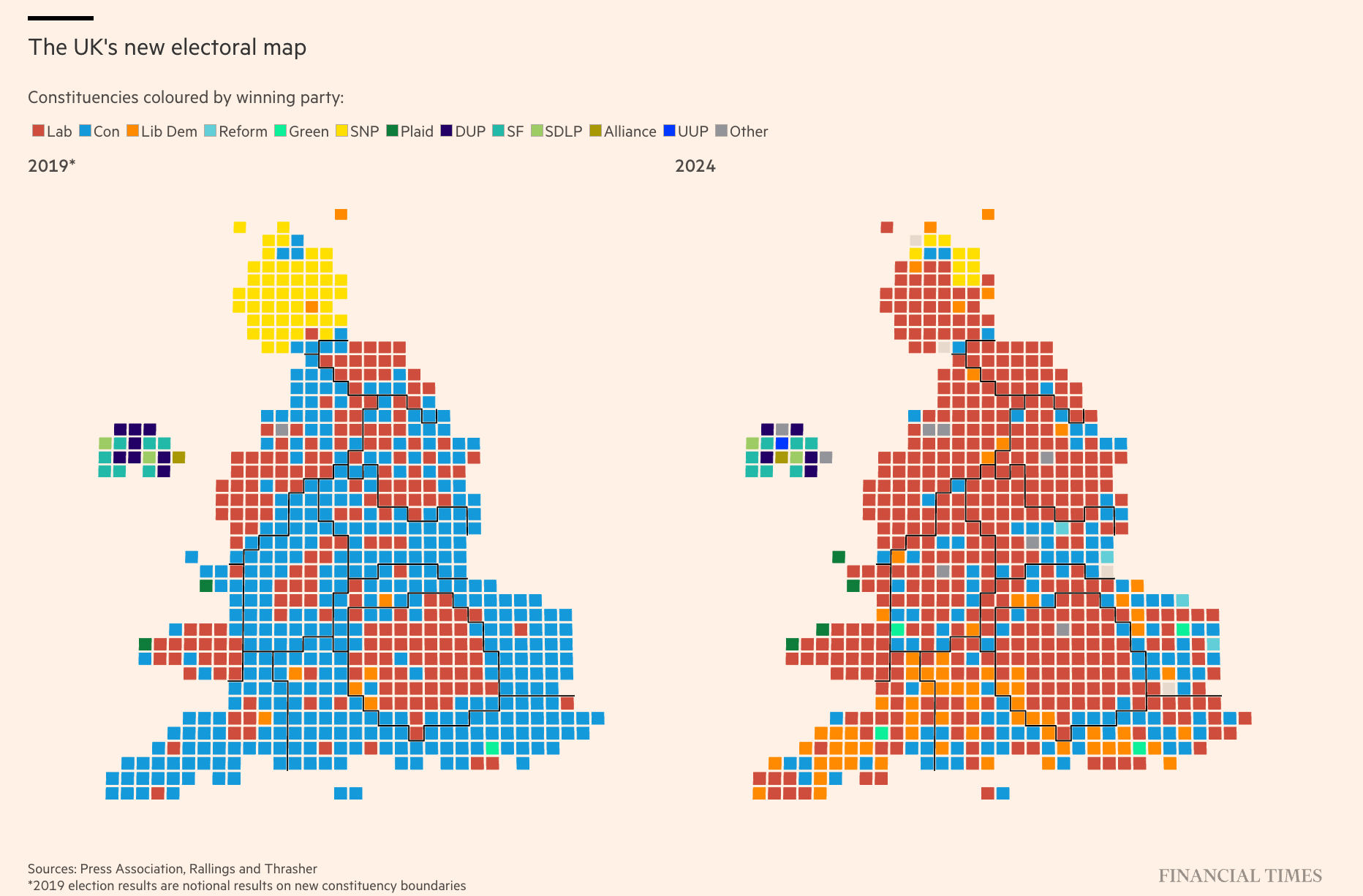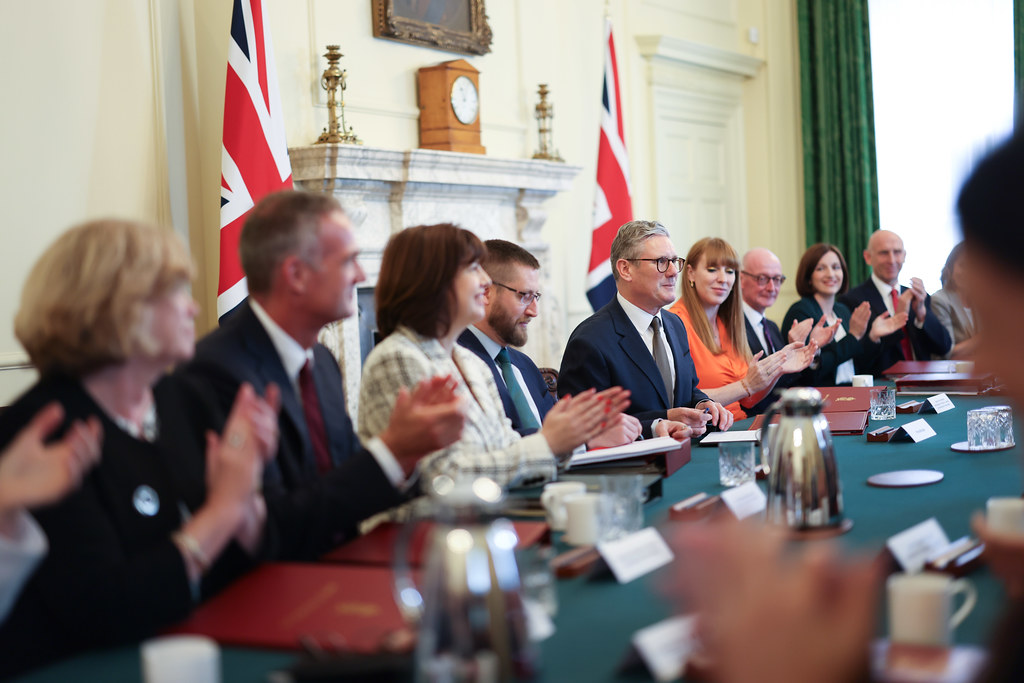
The results of the 2024 UK general election on 4 July have sent shockwaves across the British political landscape. The Labour Party led by Sir Keir Starmer, pictured above, won a landslide victory, securing 412 seats and an overwhelming working majority in the House of Commons of 181.
The results mark a dramatic end to 14 years of Conservative rule, with the party securing only 121 seats and losing over 250.
Since 2010, the Conservatives have presided over a period of stagnation and decline in many areas of British life. From crumbling public services to economic instability, the party has failed to address the issues that matter most to people. The constant leadership changes – five different party leaders and Prime Ministers between 2010 and 2014 – internal conflicts and self-serving behaviour by those in power, eroded public trust to the point where even traditional Conservative supporters had had enough.
The election results also hint at a broader shift in British politics. While Labour won a significant majority, the rise of smaller parties suggests that the era of two-party dominance is waning. The Liberal Democrats made a strong comeback with 72 seats – an increase of 61 from 2019 – while Reform UK and the Greens also made gains. This fragmentation of the political landscape reflects a growing desire among voters for alternatives to the traditional major parties.

The Conservatives (blue ) and the SNP (yellow) have all but disappeared from the political landscape, while Reform UK (light blue) came out of nowhere in early 2024 to splinter the Conservative vote / 5 July 2024 via Martin Stabe, FT, on X
It’s particularly telling that the combined vote share for Labour and the Conservatives is at its lowest since 2001. This suggests that voters are increasingly willing to look beyond the two main parties for representation. The success of Reform UK, in particular, at the far-right of British politics, which won five seats with 14% of the vote share, indicates a growing appetite for more extreme political positions.
Arguably, the appeal of Reform UK to some right-wing Conservative voters is one factor behind the collapse in support for the Tories, where Reform UK splintered that support. And I imagine broad apathy and cynicism about big politics (and politicians) played a role, too, especially as overall voter turnout was under 60%, the lowest since 2001.
A Clear Message
Still, Labour can deservedly bask in glory this weekend over its overwhelming victory even if the election results feel less like an enthusiastic embrace of Labour and more like a resounding rejection of the Conservatives. A lacklustre campaign by the Conservatives (putting it kindly) helped them not a bit. Indeed, it likely fueled anger and became part of a tipping point for some extraordinary reversals in fortunes at the ballot box, eg, the defeat of Liz Truss, Prime Minister for 49 fateful days in 2022, where the Labour challenger overturned her 2019 majority of over 26,000 to take the South West Norfolk seat; and where the Greens overturned a Conservative majority of almost 25,000 to take North Herefordshire.
As we look ahead, Labour now has its chance to prove itself. I’m willing to give them my support and see what they can achieve, and they’ll need to work hard to address the myriad issues facing the country. From rebuilding public services, especially the NHS, to grappling with immigration issues legal and illegal, to tackling economic challenges, the task ahead is monumental.

A flying start: the first Cabinet meeting of the new Labour government on 6 July 2024 / UK government photo CC BY-NC-ND
This election feels like a turning point in British politics. It’s not just about a change in government, but potentially a fundamental shift in how our democracy functions. As smaller parties gain ground and the political landscape becomes more diverse, we may be entering a new era of British politics – one that’s more fragmented, but potentially more representative of the diverse views within our society.
It has also highlighted the challenges Labour faces in balancing its relationships with both Jewish and Muslim voters. While the party has made significant strides in addressing antisemitism and rebuilding trust with the Jewish community, it has simultaneously faced criticism from Muslim voters over its stance on the Israel-Gaza conflict.
An in-depth BBC report this weekend reveals a stark contrast: Labour has seen a resurgence in support among Jewish voters, with some polls showing up to 46% support, while simultaneously experiencing a decline in Muslim voter confidence. It suffered some surprise seat losses over its stance on Gaza. The new government’s ability to reconcile these divergent issues may well determine its long-term success in building a truly inclusive and representative political movement.
And perhaps now is the time to talk about the discrepancy between the number of seats in the House of Commons and the share of the popular vote that shines a spotlight on the UK’s first-past-the-post electoral system. I think we’ll see increased pressure for electoral reform to ensure proportional representation for the next general election in 2029.
The message from the electorate is clear: we want change, we want competence, we want inclusiveness, and we want a government that focuses on improving people’s lives rather than delivering constant psychodrama such as we’ve seen non-stop with the Conservatives in recent years. It’s now up to Labour to deliver on these expectations and prove they can offer the leadership and vision that this country and all its people need.
The honeymoon will be a brief one.
Related reading:
- Clash of the Would-Be Next PMs in First TV Election Debate – 5 June 2024
- Can Labour End the Tory Reign? – 24 May 2024
- Tony Blair’s Vision for Election Success – 30 July 2023
- Jingle and Mingle should be the Tories’ epitaph – 20 June 2023
- By design or not, Liz Truss sets the scene for why time is up for the Tories – 5 February 2023











